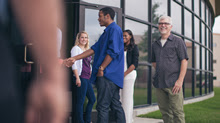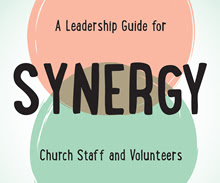 |
|
Churches need their most positive, smiling, warmest personalities on their front lines, says Greg Atkinson. Your parking lot team, greeters, ushers, and welcome desk volunteers need to be friendly and welcoming. And most of all, they need to know how vital their role is to the mission of the church.
First impressions matter — big time! Sometimes there’s no coming back from a bad experience. As someone who visits lots of churches for the first time, I have some pet peeves to share that I hope will help your church.
Parking lot attendants
Nothing drives me crazier than seeing parking lot attendants standing next to each other. There should never be two people (or more) standing next to each other and talking. Parking lot attendants should be spread out across your parking lot communicating with hand signals or walkie-talkies. When I see parking lot attendants bunched up and talking to one another, it tells me they don’t know their purpose. They don’t realize that their focus and attention need to be on greeting and pointing people in the right direction. Nothing is worse than driving by two parking lot attendants deep in conversation that don’t even acknowledge you. Trust me, I’ve experienced it and it’s a horrible first impression of your church. Give your parking lot attendants posts or positions and have them stay spread out. Remind them to focus on their responsibility and to smile and wave at cars as they drive by. Remember the atmosphere we want to create.
You must talk to your welcome team about sacrifice. They should arrive early to talk to friends, get some coffee, and do other stuff that they shouldn’t be doing while they’re serving. Once it’s go-time, they must be hands-free and focused.
Greeters
Have you ever experienced over-zealous greeters? Greeters that freak you out because they’re too happy, too nosy, or too obnoxious? Greeters need to spread out too, and leave space for people to walk. Please don’t form a wall that makes it awkward for people when entering your building. I had a bad experience at a large and well-known church one time. I can’t tell you how many hands I had to shake to enter their building.
Ushers
I think we oversimplify when it comes to training ushers. I can’t tell you how many churches I’ve visited or consulted with who had told their ushers “Stand here and give each person a bulletin as they pass.” This is a poor vision indeed. If your only job is to hand someone a bulletin, you don’t take it seriously. You don’t do anything else outside that and it’s easy to get in conversation with other ushers. If you haven’t picked up on it, I don’t like for conversations to be going on with team members. I think it’s rude and a horrible first impression. No one wants to feel like they’re interrupting your discussion to get a bulletin or find a seat. Speaking of finding a seat, that is the job of the usher. I’ve seen churches that put bulletins on a small table and let the ushers usher. I love this! Ushers should be seating people and helping those with special needs.
Hands-free
I have one last bone to pick with all team members, and this is a big one! Make sure your servant leaders are hands-free. This means they shouldn’t be holding a cup of coffee or their cell phone. Imagine a single mom struggling to corral her toddlers and holding an infant’s carrier in one hand, walking in from the parking lot, and the guy or gal at the door is too distracted by their phone to open the door for her. Or the helper is trying to open the door and not spill coffee on her and her children. You must talk to your team about sacrifice. The reason they arrive early (at least 30 minutes before a service) is to talk to friends, get some coffee, and do other stuff that they shouldn’t be doing while they’re serving. Once it’s go-time, they must be hands-free and focused.
This article is adapted from Secrets of a Secret Shopper by Greg Atkinson, published by Rainer Publishing and available at Amazon. Used by permission.
Related Resources
Read more.
|
 |
|
Your church Facebook page is a huge opportunity for opening your doors to your community, says Jeremy Steele. He shares six strategies to increase your church's reach on Facebook.
Your church’s Facebook page is like the sign in front of your church. Though most churches take good care to make sure their sign by the road is well kept and updated with current information and that it puts forward the message they want to display, the Facebook page often gets less attention.
With many people accessing Facebook multiple times a day, your page offers a huge opportunity for opening your doors to your community. That won’t happen if you don’t have anyone seeing the posts you place there. To be certain people do see them, you need to increase your page likes and subscriptions. These tips will help you start increasing your reach into your community on Facebook.
Facebook rewards pages that engage with their audience. The more you engage, the more Facebook will reward that engagement by placing your post in other feeds.
1. Use excellent profile pictures and cover images
First impressions will be based on your profile picture and cover image. Do the images seen at the top of your page convey the message your church wants to communicate? For example, rather than a photo of your impersonal church building, post pictures of actual members doing ministry or of one of your more exciting children’s activities. Learn to take inviting photos of your church that will showcase your congregation’s warmth and love.
2. Use a vanity URL for your Facebook page
Did you know that you can create a simple URL (facebook.com/YourPageName) that allows people to navigate directly to it? Learn how to claim your Facebook page Vanity URL now and add it to your church contact information everywhere you publish it.
3. Take a moment in the announcements
Sixty-eight percent of adults in the United States have smartphones. Take a minute during the announcement time in your next service to ask people to navigate to your church Facebook page and press the “like” button. Don’t make this a one-time promotion. Include a sentence weekly in the bulletin or in your announcements that says: “Don’t forget to ‘like’ our page on Facebook at [Vanity URL from step 2] to stay up to date on everything that is happening.”
4. Read and respond to comments
Facebook rewards pages that engage with their audience. Once again, this means that your Facebook page can’t be “set it and forget it.” Every time you comment on a post or reply to a comment someone else has made, it gives Facebook another opportunity to show your content. The more you engage, the more Facebook will reward that engagement by placing your post in other feeds.
5. Steer clear from too much automation
Automating social media with tools like “If This Then That” can be incredibly helpful, but there can be too much of this good thing. When all of your posts are generic links pushed from external sites, they are less likely to grab the attention of the people who like your page. If this content is not engaging, as measured by comments, likes, shares, and time on screen, then Facebook will be less likely to put your posts in the feeds of the people who like your page.
A good mix of automated posts and unique content is the remedy. To achieve that, create a volunteer social media dream team. Make these volunteers administrators of your page and encourage them to post excellent pictures, stories and short videos from your worship services and special events. Be sure to train your team on how to handle privacy and permissions and be sure you know the six questions every church social media policy should answer.
If you want to pre-schedule posts, you can do that right on your Facebook site and Facebook Pages app. Click the drop-down arrow next to the “Publish” button and you’ll see the following options:
- Schedule — Select a date and time in the future for when you want your post to publish.
- Backdate — Backdate your post so it appears in the past on your Page Timeline. Backdated posts publish immediately.
- Save Draft — Save drafts and find them later in the “Publishing Tools” tab/section.
Have your social media team study and learn what types of Facebook posts receive the most engagement. The top-performing content types in order are: photos, videos, status updates, and links.
6. Use the Facebook Page Plugin to embed content on your website.
Many people in your community and church will find the church’s website before they see your Facebook page. Use Facebook’s Page Plugin to have all the great content you are posting on Facebook show up on the front page of your website. And since your Facebook page is featured there, it will raise the visibility of your page with everyone who sees your site. This will be even more effective when you have great web hosting, have your site optimized for search engines, and are keeping your website fresh.
Your Facebook page is a significant opportunity to open the digital front doors of your church. With a little thought and a bit of extra work, it can help you be a community of open hearts, open minds and open doors.
This article was originally published by United Methodist Communications. Used by permission. MyCom provides church leaders with share-worthy tips and videos on communications, social media and new technology. Subscribe at umcom.org/MycomSubscribe.
Related Resources
|
The Right Question
Leaders do not need answers. Leaders must have the right questions.
There is a temptation to make decisions that seem right in the moment but may not be the best for the future. Suzy Welch has a method to help put immediate feelings in a longer perspective. It is called 10/10/10 and utilizes three questions to ask about decisions.
How will we feel about it ten minutes from now?
How about ten months from now?
How about ten years from now?
|
After visiting several churches, Lyda K. Hawes offers candid observations for congregations seeking new members, including "No public humiliation. No stalking. Remember us. And tell us what you really believe." Many of us will recognize her experiences in "To the Point: A Letter to Churches Seeking New Members."
My husband and I moved to the city a few years ago and have been “between churches.” We’ve been to visit quite a few of your churches and have some observations you may find helpful in encouraging more new members:
No public humiliation. Please don’t make us stand in a room full of total strangers and introduce ourselves. We want to be anonymous since we’re not sure we want to see you again; and, frankly, we’re still seeing other churches. It’s not you; it’s us. We just don’t know you very well yet.
Acknowledge we exist. Being anonymous is not the same as being invisible. We’re probably going to be a little confused about what to do and where to go, so having someone greet us and ask if we have questions is most appreciated. Plus, if you act like we’re not there, we start to think we might as well not be there.
Put it in writing. Spell out everything we need to know in the bulletin: when to sit or stand, where to find the words. Even if you have one of those groovy new digital displays, include in the bulletin what will and won’t be on the screen.
No stalking. Please don’t chase us down the street to tell us you were glad to see us. When you act like it’s a miracle of God that you have visitors, it freaks us out. We may or may not fill out an information card, but that doesn’t mean we don’t like you. It may just mean we found everything we needed on your website.
Remember us. You get a gold star if we come back and you remember our names, but just a friendly “nice to see you again” makes us feel like you noticed we were there.
Have a website. If you don’t have a website, we won’t be coming to your church. That alone tells us you aren’t ready for new people. There is simply no excuse not to have one.
When, where, what. There are basically three things we want to know when we come to your website: when your worship services are held, where you are located, and what you believe. And we really like to see all three on the home page, but at least make them SUPER easy to find and no more than one click away. If you are having special services like Christmas Eve (when visitors like us are likely to attend), please put those special worship times on the home page. We have encountered any number of church websites that seem to be more interested in looking pretty than actually being useful. You don’t have to be fancy to get what we need to decide whether to come visit.
Tell us what you really believe. Be proud of what you believe and spell it out on your website. Progressive? Great! Theologically conservative? Super! But what do those things mean in the life of your community? It’s really helpful before we show up waving our rainbow flags to know that you’ll be petitioning for an Intelligent Design curriculum in the local schools. If that is your belief, wonderful, but we both know we’re not going to be a good fit there, so let’s save each other the frustration. We’ll find out soon enough, so let’s get that awkward part out of the way online. There is someone out there who would love to find a community like yours if only they knew it existed.
Finding a new church home is not always easy, especially if the one you came from was such an important part of your lives. We were very, very close to our previous faith community; and it’s hard to think of anywhere else coming close. Or maybe we’ve never been to church, and we want to explore that spiritual side for the first time; but it’s all so new and confusing. Or perhaps we’re broken and need a place where we can be broken, and it’s still okay.
Any number of the things that might bring us to your doorstep can make it hard to do much more than show up, sit quietly in the back, and sneak out afterward. But that’s the beautiful thing about church communities — they bring new people into your life, they can open your heart and mind to new experiences, they can mend those deepest of wounds, and affirm your relationship with God. With all that on the line, don’t let the little things mentioned above get in the way of connecting people to the Good News.
This article is by Lyda K. Hawes and appeared in Leading Ideas April 25, 2012. Her blog is “See Lyda Run” at seelydarun.com. Used by permission.
|
Quotable Leadership
The most common way people give up their power is by thinking they don't have any.
[
Alice Walker]
|
The landscape of ministry is rapidly evolving as more and more lay persons take on significant ministry roles. Yet our mindset about ministry hasn't been as quick to change. Lay ministry practitioners are often ill-prepared and underappreciated, confused about their call, and unsure of their theological identity. Dr. Michel's book Synergy is a leadership guide that speaks directly to their needs.
|
|






No comments:
Post a Comment